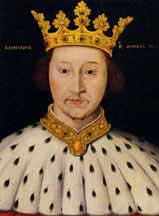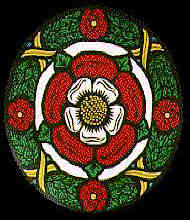| 
HE KNOWS IF YOU'VE BEEN BAD OR GOOD 
The holidays can be a trying time even for the closest of families. One can only imagine the undercurrent of familial tensions when a monarch summoned his next-of-kin for a seasonal fireside chat. It was during a Christmas court at Windsor Castle in 1126 that King Henry I, who had no legitimate male heir, tried to force his barons to accept his daughter Matilda as his successor. The Anglo-Saxon Chronicles reported that ". . . there he caused archbishops and bishops and abbots and earls all the thegns that were there to swear to give England and Normandy after his death into the hand of his daughter." Swear they did, but they were not happy about it. None of those present were interested in being among the first to owe allegiance to a woman. The stage was set for the 19-year-long bloody struggle for the throne that rent England apart after Henry's death. Ironically, the final resolution to that civil war, the peace treaty between King Stephen and Matilda's son Henry of Anjou, was ratified on Christmas Day at Westminster in 1153. Being assured of the crown was the end of one chapter for Henry of Anjou - keeping that crown was the next. His reign was riddled with filial uprisings and rebellions, often led by his wife, Eleanor of Aquitaine. Henry kept the lid on Mama's influence by keeping her imprisoned for 16 years - but he recognized that her absence from the Christmas table in 1184 would put a damper on the holiday spirit needed to induce his sons Geoffrey, Richard, and John to unite in a pledge of fidelity. In a true Lion in Winter moment, the loving family was reunited long enough for reconciliations to be offered, inheritances settled and pledges to be made around (think anyone noticed the gritted teeth and crossed fingers?).
Everyone knows Christmas is a time for children. We suppose that made it much easier for the adults sons of Edward III to pledge, before throngs of gathered nobility, to peacefully accept 10-year-old Richard of Bordeaux, son of their dead brother the Black Prince, as heir to the throne in their stead. After all, it's better to give than to receive, right? (Well, maybe not when the gift is a crown. . .) On some occasions, it was the parents themselves - not the nobility or contenders for the throne - who had to be convinced of their heir's worthiness. It was not until Christmas 1406 that Henry of Monmouth - well past his majority - was finally admitted to his father's council, the first significant gesture Henry IV made towards acknowledging his son's readiness to inherit the Crown. Six Christmases later at Eltham, with death imminent, the king summoned Prince Hal to his side and worked out a strategy to assure that sibling rivalry between the future Henry V and his brother Thomas of Woodstock would not threaten the succession. 
|
 Free Forum Hosting
Free Forum Hosting